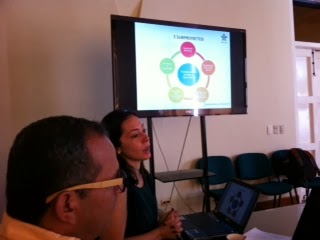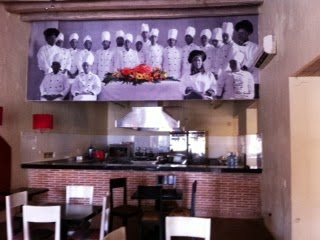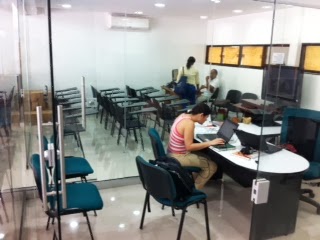Friday, 23 August 2013
Training in remote regions
Today we had a planning meeting in Cartagena with SENA staff of the Bolivar province, colleagues from the provincial Ministry of Mining, the program Manager from CIDA/DFATD Ottawa and two of us from ACCC. This meeting followed the meetings we had the past days in Bogota.
Sandra (with whom I do most of my coordination work in Bogota) gave a summary of what we discussed in Bogota earlier this week. The slide above is a visual on the five sub-projects we hope to start up in early 2014 on small scale mining (2), small scale precision agriculture (1), water treatment (1) and entrepreneurship for non-traditional learners (1). The slide below shows the 6 areas in which we hope to contribute from the Canadian side while the green box in the bottom shows the work SENA afterwards will have to do for program sustainability.
We kept well to our agenda and then left the small campus in the historic city of Cartagena for a visit of two SENA training centers outside of the city. In this smaller campus SENA offers one of their more advanced culinary programs with a training restaurant open for the public.
They also had a meeting today at this campus of SENA alumni to see what they have been doing since graduation. This gives the organization important feedback for program improvements.
The organization is serious about quality program delivery despite the many challenges they face and the incredible amount of clients they have (7 million trainees and students each year). Here is the ISO certification of some programs in the office of Bibiana who manages the training center for mining & agriculture in Cartagena (covering training in the entire province).
And a maybe even more important "certification" is the picture below which was a congratulation of all the mayors of all the municipalities in the province of Bolivar for SENA's 50th birthday....
SENA offers short training programs for anybody who needs it (40 to 360 hours and no entry requirements), 6 months "operator" training (3 months theory + 3 months practical work in a company or organization; entry requirement Grade 8), 12 months certificate programs (6 months theory + 6 months practical; entry requirement Grade 10) and 2 year diplomas (18 months of theory + 6 months practical; entry requirement Grade 12). SENA organizes "fairs" during which the practical work of students is displayed to the public. Below is an announcement of such an event.
Bibiana is a true innovator and a great administrator for such activities. Today she changed her office into an occasional restaurant to host us all.....
After lunch we had a visit to some of the program areas under her supervision. On the way we met with a couple of success stories she wanted us to know about. Below a former student now teacher (second to the right next to Bibiana on the right):
This is the current Student Council Leader. An incredible humble and promising person.
With this training center Bibiana and her team offer programs in a province which takes two days by car to go from Cartagena in the north to the south of the province; most of the region is better to travel by small river boats (see my blog posts of February and March). In order to offer programs in remote communities SENA has a variety of "mobile labs/classrooms". Above is one side of a truck which offer rural training & applied research programs for small farmers. On the photo below you can see that the other side of the truck moves out and makes room for the lab/classroom:
All the displayed equipment is for testing soils and water. SENA trains people on the use of the equipment in order to stimulate them to improve the efficiency of their farming. With the help of satellite images we can nowadays do what is called "precision agriculture": farm the crops in those areas where the best soil is for that crop. With our EFE program we aim to "add value" to this work in regions of the province where agriculture suffered from the explosion of small scale gold mining.
This is another mobile lab/classroom with a focus on fruits and conservation. For that aspect of agriculture the knowledge of chemistry is very important. SENA trains many chemistry laboratory technicians. Below a few photos of one of the training programs in action:
In the small "outside" area of the campus they have constructed a few "country-side" classrooms in the middle of a few experimental gardens. Just a few images of that area:
Each SENA campus has an area to stimulate and assist aspiring and current entrepreneurs:
We then visited a second campus of which I made a special blog post in early July (I dedicated that post on "gender mainstreaming" because the coordinators of an applied research center at that campus are both female educational leaders). It was very nice to visit again and hear that after the launch in June this year they now already have a few research contracts with local industry...
Subscribe to:
Post Comments (Atom)
































No comments:
Post a Comment